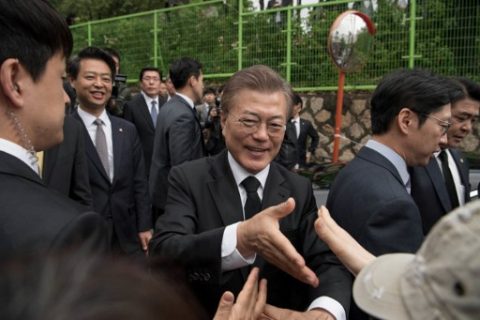
The left-leaning former human rights lawyer began his five-year term as president of South Korea following a landslide election win after a corruption scandal felled the country’s last leader. / AFP PHOTO /
SEOUL, South Korea (AFP) — New South Korean President Moon Jae-In on Wednesday declared his willingness to visit the nuclear-armed North, moments after taking his oath of office.
Tensions are high over the North’s weapons ambitions and Moon — who backs engagement with Pyongyang — said he would work for peace.
“If needed I will fly to Washington immediately,” he said. “I will also go to Beijing and Tokyo and even Pyongyang in the right circumstances.”
He also said he would have “serious negotiations” with the US and China over the controversial deployment of the US anti-missile system THAAD.
The deployment of the powerful system — aimed at guarding against threats from nuclear-armed North Korea — has infuriated Beijing, which sees it as a threat to its own military capability.
China — the South’s biggest trading partner — has taken a series of moves against South Korean firms seen as economic retaliation, which strained ties.
“I will do everything I can to build peace on the Korean peninsula,” Moon said, vowing to “further strengthen” the alliance with key ally Washington.
United States President Donald Trump recently suggested Seoul should pay for the $1 billion deployment of the anti-missile system, sparking anger in Seoul.
The move raised questions over the ties between Seoul and its security guarantor, Washington, which has 28,500 troops stationed in the South.







